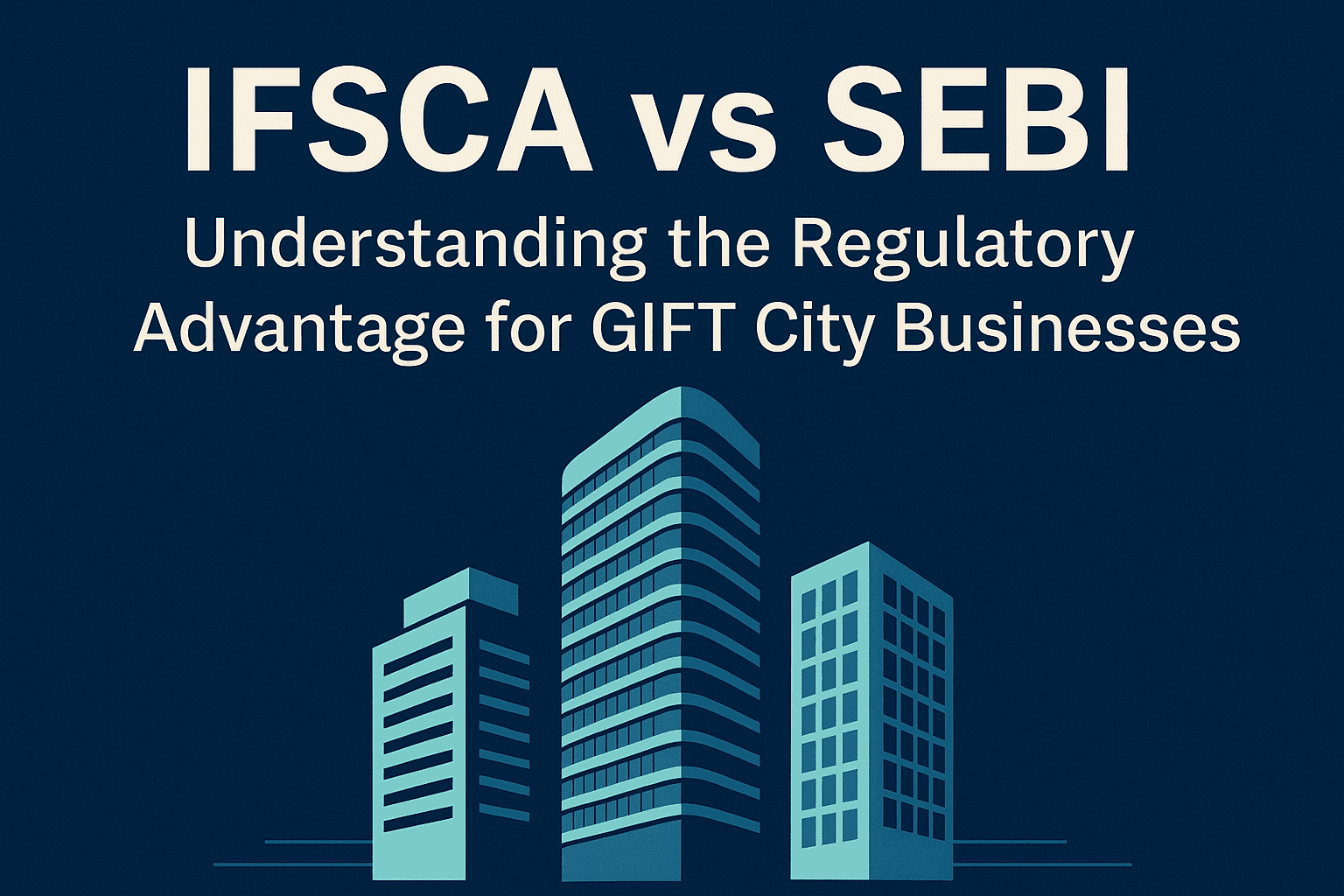Index
ToggleIntroduction
India is rapidly becoming a preferred destination for global financial institutions, fintech startups, and cross-border investors. At the heart of this transformation is GIFT City (Gujarat International Finance Tec-City) — the country’s first operational International Financial Services Centre (IFSC). As more entities look to set up in this innovative financial ecosystem, one question frequently arises:
What’s the difference between IFSCA and SEBI? And how does choosing IFSCA give GIFT City businesses a regulatory advantage?
This article explores the key distinctions between IFSCA (International Financial Services Centres Authority) and SEBI (Securities and Exchange Board of India), and how the IFSCA regime offers unique advantages for global and domestic businesses operating from GIFT City.
What Is SEBI?
SEBI is India’s apex regulatory body for the domestic securities market, established in 1992. It governs and supervises activities such as:
Stock exchanges and market infrastructure institutions (MIIs)
Mutual funds and asset management companies
Securities brokers, portfolio managers, and investment advisors
Corporate listings, takeovers, and disclosures
SEBI plays a protective role for retail investors in India and is known for enforcing stringent compliance, disclosures, and investor transparency norms.
💡 SEBI is ideal for businesses operating within India’s domestic financial system.
What Is IFSCA?
IFSCA was established under an Act of Parliament in 2019, specifically to regulate all financial activities conducted in India’s International Financial Services Centres (IFSCs) — with GIFT City being the first and most prominent.
IFSCA serves as a unified regulator, combining powers across sectors like:
Banking (RBI-like)
Insurance (IRDAI-like)
Securities markets (SEBI-like)
Asset and fund management
Financial technology (FinTech), leasing, education, and more
💡 IFSCA offers an offshore-friendly, globally benchmarked framework for international businesses
Regulatory Advantage of IFSCA for GIFT City Businesses
1. Unified Licensing, Reduced Complexity
Under SEBI and other Indian regulators (RBI, IRDAI), businesses often need to apply to multiple authorities for sector-specific operations. This leads to:
Delayed approvals
Overlapping compliance
Increased legal and consulting costs
In contrast, IFSCA offers a single-window clearance system for all financial activities in GIFT City. Whether you’re a fintech startup, fund manager, or global bank, IFSCA offers an integrated license to operate across verticals with harmonised compliance standards.
2. Foreign Currency Operations Made Easy
While SEBI-governed institutions deal in Indian Rupees (INR), IFSCA-regulated units operate in freely convertible foreign currencies. This has significant benefits:
No foreign exchange restrictions
Direct invoicing in USD, EUR, GBP
Smooth cross-border transactions
Ideal for NRIs, foreign companies, and export-driven services
This currency flexibility makes GIFT City units particularly attractive to global investors and MNCs looking to diversify from Singapore, Dubai, or London.
3. Favourable Tax Regime
Perhaps the biggest edge IFSCA offers over SEBI is the tax neutrality provided in GIFT City. Businesses operating under IFSCA enjoy:
100% income tax exemption for 10 consecutive years (within 15 years)
No GST on specified financial services
No capital gains tax on listed securities transactions
Stamp duty exemptions
Free profit repatriation
These financial incentives are unavailable under SEBI’s domestic regime, where taxation norms are stringent and increasing.
4. Full Foreign Ownership Allowed
In India’s domestic financial markets, SEBI imposes various FDI caps and ownership thresholds depending on the sector:
Mutual Funds: 100% FDI
Stock Brokers: 49% FDI
Insurance: 74% FDI
Portfolio Managers: 100% FDI with restrictions
In contrast, IFSCA allows 100% foreign ownership across most business types within the IFSC, including fintech, fund management, and even banking (subject to IFSCA eligibility).
This encourages global expansion without dilution, making GIFT City a prime offshore base for foreign players.
5. Innovation Sandbox & Tech Focus
While SEBI has initiated limited sandbox environments for specific verticals (e.g. investment advisory), IFSCA has a dedicated FinTech Sandbox that allows:
Regulatory waivers during product trials
Live testing with actual users
Fast-tracked licensing upon validation
Access to GIFT City’s global financial ecosystem
This makes IFSCA a launchpad for fintech innovation — including blockchain, Web3, neobanking, wealthtech, and cross-border payments.
Case Examples
Let’s compare how a fintech company and a fund manager benefit more under IFSCA:
✔️ Fintech Startup:
Under SEBI: Requires separate NBFC, PPI, or aggregator licenses; restricted cross-border activities
Under IFSCA: Start in regulatory sandbox, access global clients, 100% FDI allowed, tax-exempt income
✔️ Fund Management Entity:
Under SEBI: Must follow AIF/Mutual Fund regulations; complex onboarding; investor caps
Under IFSCA: Flexibility in fund structures, foreign investor onboarding, global fund distribution allowed
Conclusion
While SEBI remains the backbone of India’s domestic securities market, IFSCA opens a parallel gateway — purpose-built for international finance, innovation, and ease of doing business.
If your business caters to non-resident clients, handles foreign currency, or seeks to tap into global capital, operating from GIFT City under IFSCA is a strategic regulatory upgrade.
✅ Unified compliance
✅ Global scalability
✅ Massive tax savings
✅ Ownership freedom
✅ FinTech-ready regulation
Whether you’re a startup, an NRI investor, or a global institution, GiftCityAdvisor can help you assess, register, and launch your operations in the IFSCA zone—fast, smart, and fully compliant.
Need Help Navigating SEBI vs IFSCA?
We simplify it for you. Contact our experts at GiftCityAdvisor.com for a free consultation today.

